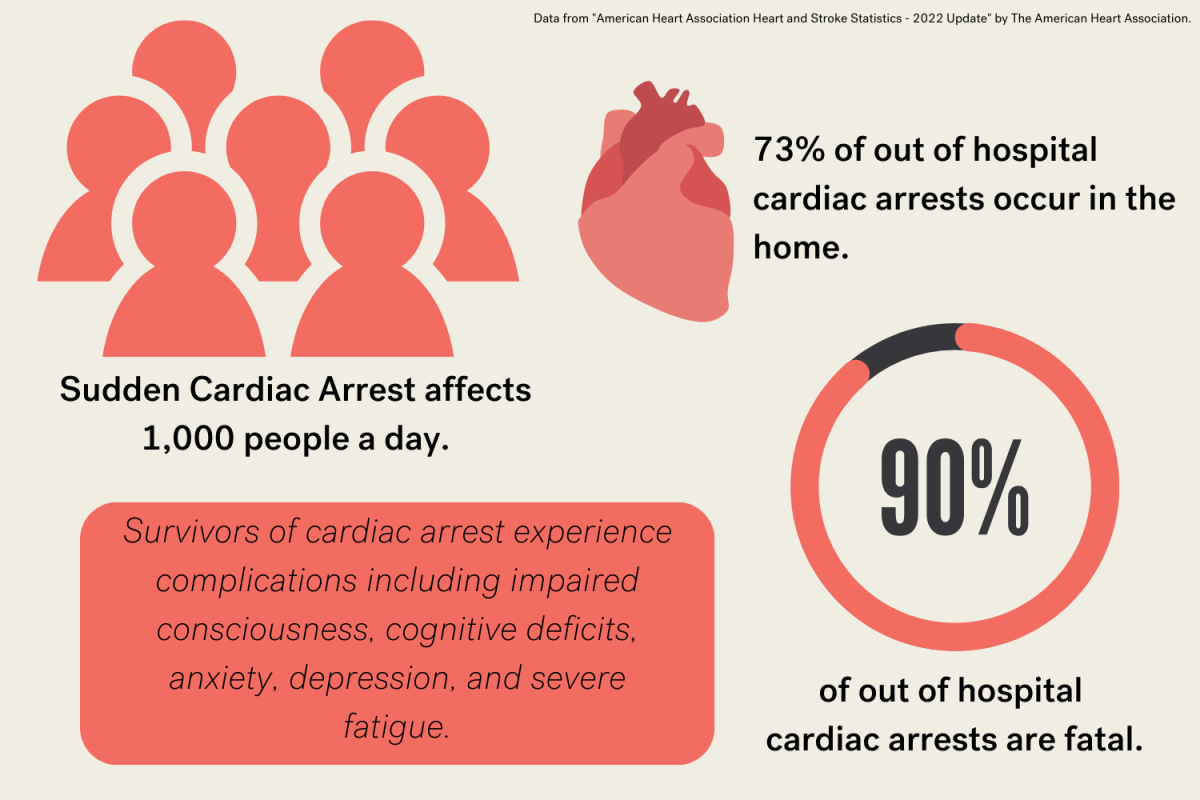
“When people say death is just a part of life, I take that very literally,” 39-year-old Lauren Canaday told Newsweek.
Eight months ago, Canaday, who lives in Virginia, experienced a sudden cardiac arrest—sudden loss of heart function, typically due to an irregular heart rhythm, leading to the stopping of blood flow to the body—in her home, resulting in her being clinically dead for a staggering 24 minutes. Now, she is working to share her experience of life after a near-death encounter.
Canaday, who has been on medication for controlled epilepsy for years, suffered a grand mal seizure, that causes violent muscle contractions and loss of consciousness, in her home and stopped breathing.
“My husband was across the hall and heard me say, ‘oh s***,'” Canaday explained. “He rushed in to find me unconscious on the floor. I had stopped breathing and turned blue.”

Quick thinking by her husband, who promptly dialed 911 and performed CPR for four minutes until emergency medical technicians (EMTs) arrived, played a crucial role in her survival. It took 24 minutes and four defibrillator shocks to restore her heartbeat.
CPR meant that Canaday got oxygen while she was suffering cardiac arrest. Without it, within one minute, brain cells begin to die, and by 10 minutes so many brain cells have died that a patient is unlikely to recover. At 15 minutes, recovery is virtually impossible, according to University of Michigan’s Transplant Center.
Rushed to the hospital, Canaday said she was admitted to the Intensive Care Unit (ICU), where she tested positive for COVID-19, and doctors diagnosed her with myocarditis—a condition that inflames the heart muscle, potentially leading to a reduction in the heart’s pumping ability. Canaday said her medical team speculated that the sudden cardiac arrest might have been triggered by the COVID-19 infection. The Sudden Cardiac Arrest Foundation told Newsweek: “According to one of our medical advisors, COVID myocarditis can cause cardiac arrest.”
A paper published in the Heart Rhythm journal in 2023 reported the results of a two-year prospective evaluation in a North American community during the COVID-19 pandemic reported a higher incidence of sudden cardiac arrest and lower survival rates. Another paper by researchers at the University of California highlighted that COVID-19 can lead to cardiac arrest through multiple pathways, including the respiratory illness itself and its impact on the cardiovascular system.
What Was It Like To Be Clinically Dead?
Remarkably, just nine days later, Canaday was discharged from the ICU. But what was it like to be clinically dead?
Although she cannot recall specific visions or shapes, Canaday describes the encounter with death with intriguing positivity.
I have this gut feeling that it was friendly and peaceful.
Lauren Canaday
“I have this gut feeling that it was friendly and peaceful even though I can’t report any shapes or personas or visions of that time,” Canaday recalled. “I feel like I dissolved, and it was just really nice.”
Despite no clear memory of feelings or thoughts during the incident, she added: “What I have is a strong sensation of peace about that time when I was out of consciousness.”
The Sudden Cardiac Arrest Foundation told Newsweek: “Out-of-hospital cardiac arrest affects about 1,000 people a day. But survival to hospital discharge after emergency-service treated cardiac arrest is just 10 percent.”

According to The American Heart Association, 73 percent of out-of-hospital cardiac arrests occur in the home, and 90 percent of these are fatal.
Canaday’s memory of her initial recovery is understandably hazy. “I got frustrated a lot those first few days because I had no short-term memory and didn’t understand what was going on, and I was just super uncomfortable,” she said.
However, she recalled finding happiness in small moments of joy in the hospital, like taking a shower and eating a cheeseburger.
When she was discharged from the hospital, Canaday was declared “cognitively intact,” with no visible brain damage on her MRI scans. She also exhibited a normal EEG, despite a history of seizures and status epilepticus, characterized by an acute, prolonged epileptic crisis, lasting for 30 minutes after resuscitation.
As her recovery continued, Canaday explained that something in her mindset shifted too. “I remember a lot of very serene moments in and after the hospital, like none of the worries I used to have mattered, and I got insanely excited about things like cheeseburgers. Things just felt very simple,” she said.

The American Heart Association reports that survivors or cardiac arrest often experience complications including impaired consciousness, cognitive deficits, anxiety, depression and severe fatigue after the ordeal.
As she continues to deal with the aftermath of the life-altering experience, Canaday explained that life feels different. “I feel like this is my second life. I feel like I have two birthdays,” she said. “In my first life, I was very individualistic and strong. In this life, I have a completely different worldview and am comfortable—mostly—with depending on others.”
Since her experience, Canaday was forced to give up her job, but in November 2023, she released her memoir, Independence Ave: How Individualism Killed Me and Community Brought Me Back, where she explores how to confront chronic illness and build a connected and fulfilling life.
Explaining the new worldview of her “second life,” Canaday said: “A lot of stuff like status and career success don’t matter beyond survival needs, creature comforts, and helping others.
I feel like this is my second life.
Lauren Canaday
“I honestly feel like I’m here to love my husband and make life a little easier, if I can, for those I meet along my own path.”
Today, she explained life is all about the basics, with her priorities including sleep, healthy eating, exercise, contemplation and relationships.
“I try to walk 10,000 steps a day and hike once a week as far as I’m able,” she said. “I take a lot of time to be quiet, including silent prayer or meditation. I go to bed around 8 p.m. most nights.”
Canaday’s openness about her condition is not just personally healing, either. She explained that she hopes speaking out about her experience will help change lives.
Only 10 percent of out-of-hospital SCA sufferers will survive, and experiences like this are incredibly rare, but in January, the Sudden Cardiac Arrest Foundation (SCAF) launched the Arrest Survivor Alliance, an online community of survivors, family members, and advocates. “We now have about 1,200 members—75 percent survivors—from 24 countries,” the SCAF said.
“It’s unfortunate that I experienced an SCA, but amazing that I was declared cognitively intact. So many SCA survivors aren’t as well off, or able to advocate for themselves,” said Canaday.
“I don’t know why I’m here, or why any of us are here, but I know we’re all in it together. That’s why I’m passionate about sharing my story, I guess. It’s not just my story. It’s a lot of people’s.”
Is there a health issue that’s worrying you? Let us know via [email protected]. We can ask experts for advice, and your story could be featured on Newsweek.
Uncommon Knowledge
Newsweek is committed to challenging conventional wisdom and finding connections in the search for common ground.
Newsweek is committed to challenging conventional wisdom and finding connections in the search for common ground.

